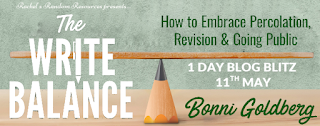BOOK SYNOPSIS
Bonni Goldberg’s The Write Balance introduces you to alternative perspectives and motivation for lasting creative fulfillment. This companion book to the beloved bestseller, Room toWrite is filled with encouragement, tools, examples and exercises.
Through years of teaching writing in workshops and in classrooms, Bonni has seen that the writers who are most passionate and grounded in their Writing Self embrace three aspects of the writing process: nurturing ideas, revising to best communicate those ideas, and completing the writing cycle by going public.
In this powerful guide, Bonni invites you to explore these creative stages which are essential to satisfying your Writing Self.
Use The Write Balance to:
Find Fulfillment as a Writer
Explore Creative Writing
Add to Your Writer’s Toolbox for Perspective
Overcome Writer’s Block
Teach Creative Writing
Inspire Your Writing Group
Give as Gifts to the Writers in Your Life
One of the main themes in The Write Balance is that writers (and really all creatives ) can get stuck in practicing their writing in a particular way. Then it stops working. Like most practices in life, change is necessary to feeling satisfied or fulfilled. As we evolve, we have to adjust how we do things as well as how we see them or risk a life reliving the past instead of embracing the present. In this section of the book about revising writing, I focus on something anyone, no matter who they are can do to get out of a rut and find a new perspective.
A tendency common to people who struggle with rewriting is that they are Functionally Fixed, a term developed by writer and educator Ben Reynolds. This refers to the ways in which we routinely do things because they work for us. For instance, every morning I shower first thing. It helps me wake up gently, and it gives my husband time alone with our daughter before he leaves for work. So there’s nothing wrong with my shower practice. It’s practical. But Ben’s idea is that if we challenge any aspect of our functional fixedness by making a change, we can create a shift in our perceptions, the way a vacation gives us a fresh outlook by taking us away from our normal routine. The change may not be enormous, but it can be potent and useful.
During one of my attempts to get functionally unfixed, I took my shower later in the morning for a week. The first day I got to see the sunrise as I ate my breakfast. It was uplifting. On the second day, when my skin-and-bones toddler wanted cream cheese and jelly on a bagel—which always turns into her licking the jelly off and asking for more—for the first time I realized I could put the cream cheese on top of the jelly instead of the other way around. Sure enough, she ate the high-calorie cream cheese on her way to the jelly. That afternoon I made myself a lunch of sliced egg on toast and I shook the salt and pepper on the bread before I put the egg on top. I liked it much better that way because salt wasn’t the first thing I tasted, and the pepper didn’t burn my lips.
These were tiny changes, but they were improvements in my everyday life. The next day I had on my list to print out all the e-mails that were cluttering up my on-line mail folder. I’d been putting off this chore for weeks because it seemed overwhelmingly boring. I looked at the twenty or so files, and suddenly it occurred to me that I could print out three a day over the next week. The shift in the way I saw the work made it manageable. Our Writing Self gets functionally fixed when it comes to rewriting. We have our attitudes about revision, our ways of doing it, or our reasons not to do it at all. When we challenge just one of these beliefs, we create a shift. By examining your rewriting attitudes, you can decide which one you want to change. Ask yourself these questions: What does revision mean to me? How do I do it? Why do I do it? Your answers will include your functionally fixed concepts.
AUTHOR INFO
Bonni Goldberg is the author of The Write Balance: How to Embrace Percolation, Revision & Going Public , the companion book to the best-seller Room to Write: Daily Invitations to a Writer’s Life . Bonni is an award-winning poet and writer. She is the creator of the 2 Minute Journals ™ series. Both traditionally and indie published, her books include non-fiction for adults and fiction and non-fiction for young readers. Her essays and blog posts can be found in numerous print and online publications.
Bonni teaches creative writing at colleges and leads writing workshops internationally for all ages. She knows everyone is creative, and she supports people to discover and share their authentic, meaningful and imaginative experiences through words. Whether through her writings or through teaching, her methods and perspectives continue to empower thousands of adults, families, and children.
Bonni is also a Jewish educator. She speaks, writes, and leads workshops on Jewish topics such as Jewish identity, rituals and antisemitism at Jewish women’s events, JCCs, and conferences. Bonni Goldberg lives in Portland, Oregon with her partner in life, and some creative projects, artist Geo Kendall.
SOCIAL MEDIA LINKS....
https://bonnigoldberg.com/
https://m.facebook.com/bonnigoldbergbooks
https://mobile.twitter.com/bonnigoldberg
https://www.instagram.com/goldbergbonni/
BOOK PURCHASE LINK...
https://books2read.com/u/3n2XQ9
https://www.rafflecopter.com/rafl/display/7598c2160/





Thanks for sharing this book! I have Bonni Goldberg's first book for writer, Room To Write, which is amazing! Can't wait for this one to be delivered.
ReplyDelete